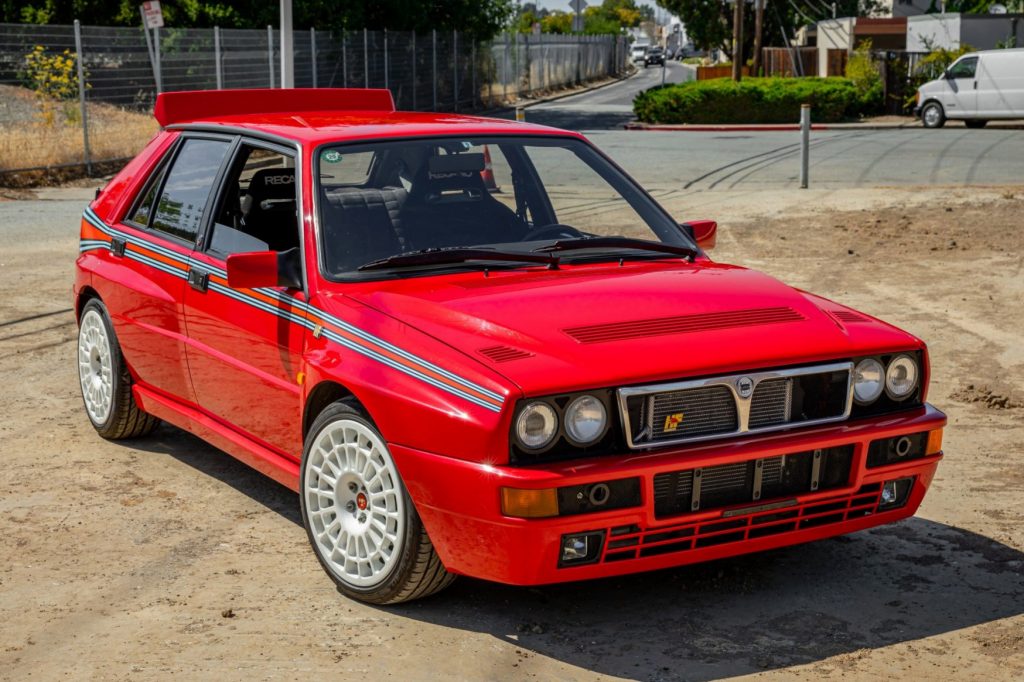























Description
This 1992 Lancia Delta Integrale Evoluzione was acquired in Japan by the owner in 2018 and subsequently imported to the US. The car is finished in Rosso Monza with Martini Racing-inspired stripes over a gray fabric interior and is powered by a rebuilt turbocharged 2.0-liter inline-four that drives all four wheels through a five-speed manual transmission. Features include Evo-specific bodywork, air conditioning, a Continental CD stereo, an upgraded turbo and camshafts, Bilstein shock absorbers, Recaro SR-2 seats,…
This 1992 Lancia Delta Integrale Evoluzione was acquired in Japan by the owner in 2018 and subsequently imported to the US. The car is finished in Rosso Monza with Martini Racing-inspired stripes over a gray fabric interior and is powered by a rebuilt turbocharged 2.0-liter inline-four that drives all four wheels through a five-speed manual transmission. Features include Evo-specific bodywork, air conditioning, a Continental CD stereo, an upgraded turbo and camshafts, Bilstein shock absorbers, Recaro SR-2 seats, and 17” Speedline wheels.
The Evolution I features an adjustable rear spoiler and boxed fender flares to accommodate the extended track width. This example is finished in Rosso Monza (159) and features red and blue Martini Racing-inspired stripes on the sides and hatch, along with a front chin guard and Evo 2-style grills. The seller reports that the hood was repainted prior to the car’s importation, and areas of corrosion around the roof and a window were repaired.
The 17” Speedline wheels were refinished and feature Abarth-branded center caps and are wrapped in Pirelli tires. Stopping power is provided by anti-lock four-wheel discs, and the car rides on Bilstein shock absorbers.
The cabin features Recaro SR-2 front seats with confetti-patterned inserts along with a gray Alcantara-upholstered rear bench and a matching dashboard and door panels. HF-branded mats line the floors, and a Continental CD stereo is installed in the center stack. The air conditioning system was serviced under current ownership.
The three-spoke steering wheel frames yellow-letter Veglia instrumentation that includes a 240-km/h speedometer, a 9k-rpm tachometer, and gauges to monitor boost pressure, fuel level, voltage, and temperature. The six-digit mechanical odometer shows just over 50k kilometers (~31k miles).
The turbocharged and intercooled 2.0-liter DOHC inline-four is transversely mounted and sends power to all four wheels through a five-speed manual transmission and a Torsen limited-slip rear differential. The engine and cylinder head were reportedly rebuilt and fitted with an upgraded turbo system and camshafts by Dino Motors of San Mateo, California, in May 2020. After observing smoke on a cold start, Dino Motors polished the crankshaft and replaced the main bearings, piston rings, and valve seals in November 2020.
- 50k Kilometers (~31k Miles) Shown
- Turbocharged 2.0-Liter Inline-Four
- Five-Speed Manual Transmission
- All-Wheel Drive
- Torsen Limited-Slip Differential
- Rosso Monza
- Gray Fabric Upholstery
- Confetti-Pattern Recaro SR-2 Seats
- 17″ Speedline Wheels
- Bilstein Shock Absorbers
- Air Conditioning
- Continental CD Stereo
- Imported From Japan in 2018








